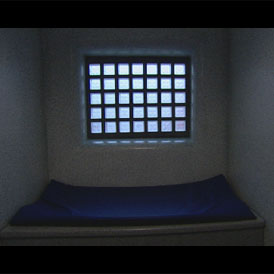Children kept overnight in police cells 50,000 times a year
Under 16s are kept overnight in police cells more than 50,000 times every year in Britain. Channel 4 News Home Affairs Correspondent Simon Israel reports on plans to reduce the figures.
Bang, bang, bang… “Anyone there?” The adult voice resounds around the main police custody suite in Hull. Then more shouts: “I need help,” the woman cries.
In the midst of the yelling, a 21-year-old is being processed at the front desk. He has been arrested for drug abuse. He groans as he wrestles with the handcuffs and the officer standing behind him.
“Have you got any pills secreted on you,” the officer asks. The request is met with another groan, then a “**** off!” The officer patiently explains that, if the pills are bad and the prisoner takes them and he dies in his cell, then it is him, the officer, who is “in the ****”.
“I want to die,” says the prisoner. “Well, I don’t want you to, so we’re going to have to strip-search you.”
This is typical of the soap opera played out in a police custody suite virtually every night of the week. Even police officers admitted to us they have nightmares. One described how it was difficult to put out of her mind the images of the aftermath of a woman smashing her head repeatedly against the cell door in a wild, drunken, disturbed act.
Sarah's story
We filmed a 16-year-old girl in Hull being brought in close to midnight, having been arrested for stealing a can of lager from a well-known supermarket. She was intoxicated but clearly traumatised. It was her first time in a cell.
We will call her Sarah, although that is not her real name. She was put in an adult cell because it has CCTV, so officers can keep an eye on her. By morning Michelle Gilbert, the custody suite's full-time youth justice worker, arrives. Her aim is to find ways to get Sarah to avoid entering the criminal justice system.
Ms Gilbert invites Sarah's mother to the custody suite. There is an emotional meeting. Sarah feels humiliated. Behind the moment of madness, stealing a can of beer, lies a whole host of educational, social and psychological issues.
They come to an agreement. The youth justice worker promises intensive support. Sarah acknowledges her guilt and vows not to get into any more trouble.

Marooned overnight
Just imagine a child – defined by law as 16 or under – being brought into this enviroment and spending one night in a police cell, marooned.
Over 24 months between 2008 and 2009, according to a Freedom of Information request by the Howard League for Penal Reform, there were at least 53,000 instances of children locked up overnight. The numbers break down further: 13,000 involved children between the ages of nine and 13. The remaining 40,000 are aged 14 and 15.
But that is such an underestimate. Only 24 out of the 43 police forces in England and Wales responded with the information. Nor do the figures include London – the task to collate such details was too great for the Metropolitan Police.
So you can at least double that original figure, which means we are talking way over 50,000 instances of police cells being used to lock up children for at least one night. That is somewhere between 150 and 200 a night.
Clearly many of these cases involve troubled youngsters in one way or another, and many are probably drunk, so the police have a duty of care. But the figures are shocking.
Hull is running a joint programme to keep children out of custody. In 2008 Humberside police found they were locking up hundreds of children with little or no effect on teenage reoffending rates.
Youth reoffending is down 80 per cent. Police officers refer all child non-violent offenders to the youth justice team. Numbers locked up have dropped by half. It is a programme the Ministry of Justice is looking at because Ministers are well aware the country’s locking up far too many children.